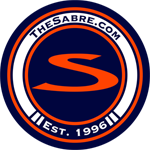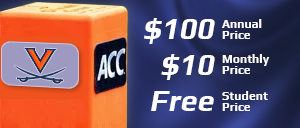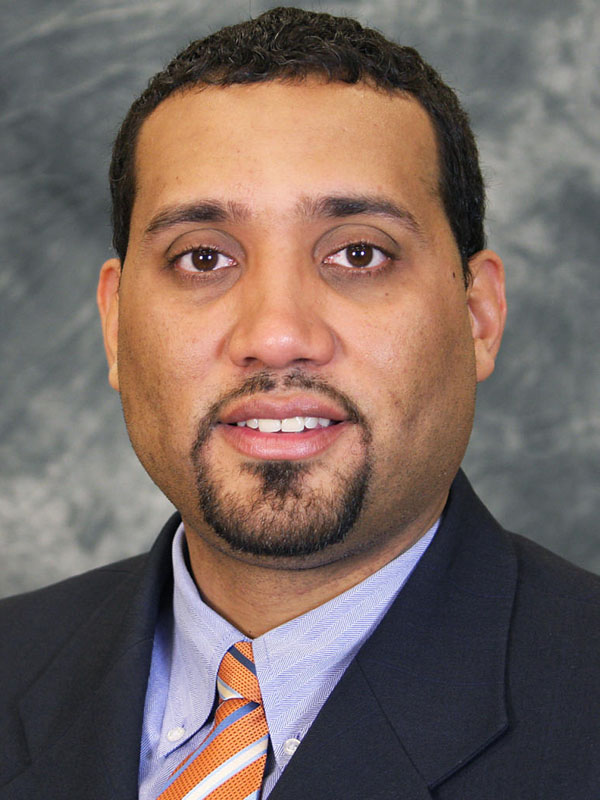 |
Jason Williford has been coaching collegiate basketball for 12 years. Nearing the conclusion of his third year as a Virginia men’s basketball assistant coach, Williford has come full circle – from UVa player to UVa assistant coach – and is exactly where he wants to be, back within the Virginia basketball program.
A native of Richmond, Williford’s basketball journey to UVa started as a high school athlete playing for John Marshall High School, where his father was an assistant coach. Williford came to Virginia as one of the members of head coach Jeff Jones ‘ first recruiting class. That class, which included Williford, Junior Burrough, Cory Alexander, Yuri Barnes and Chris Alexander, is considered one of the best of all time for Virginia.
While Williford didn’t see much action his first year, that team (which included Hoo hoops legend Bryant Stith) won the postseason NIT Championship. The tournament run was a springboard of sorts for things to come as the Cavaliers made the NCAA Tournament the next three seasons, registering a record of 64-32 (29-19 ACC) in that time. Williford’s senior class completed its journey with an improbable Elite 8 NCAA Tournament run in 1994-95, defeating fifth-ranked Kansas in the Regional Semifinals (Sweet 16) before eventually being ousted by sixth-ranked Arkansas in the Regional Finals.
Virginia fans remember Williford as a tough competitor and vocal leader, always working without the ball, playing tough defense, hitting the boards hard, and doing the little things that made UVa a successful program. Williford finished with 710 points, 571 rebounds, 198 assists and 98 steals over his four year career. Aside from time healing from a preseason injury his senior year, Williford started every game in his final three seasons (83 starts in all).
“Jason was always the ultimate team guy,” said former teammate Cory Alexander. “He would do whatever he needed to do to get on the court. If he had to play small forward, he’d play small forward. He started his sophomore year as a shooting guard. His senior year, because of the talent we had, he played a majority of his minutes at power forward. So, he was never concerned about his own individual accolades. It was always what was best for the team.”
After graduating from UVa, Williford played professional basketball overseas – four years in the Icelandic Professional League and the Korean Basketball League. He was named the Foreign MVP for the Haukar Club while in Iceland and earned All-Star honors while playing for two teams in Korean.
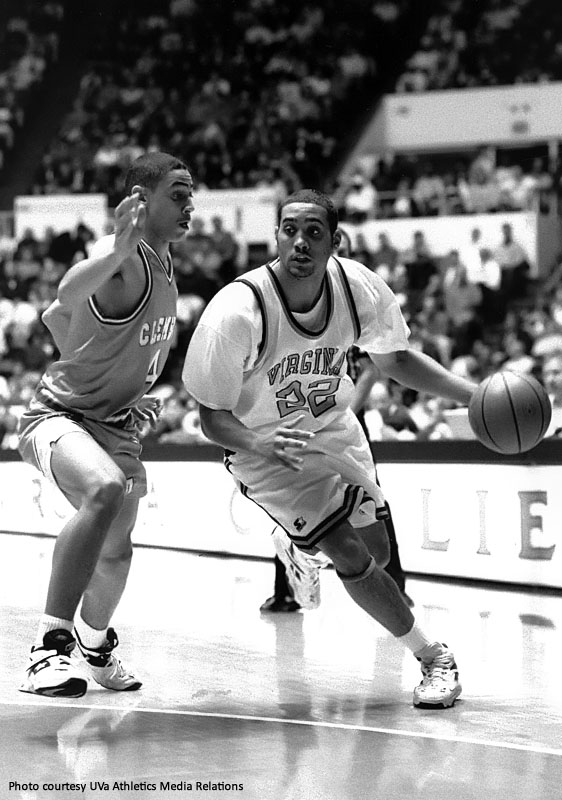 |
Williford’s first taste of coaching came when he was surprisingly asked to help coach the Under-20 Haukar Club team in Iceland. Immediately following professional basketball, Williford returned home to help coach his high school alma mater in 1999-2000. Williford continued coaching stints with Boston University under former UVa basketball assistant coach Dennis Wolff, where the Terriers earned an NCAA Tournament berth in 2002 and participated in the NIT the next three years. Williford was then brought aboard Jeff Jones ‘ staff at American University, helping his fellow UVa alum to Patriot League Championships and participation in the NCAA Tournament his final two years.
Williford nearly joined the Virginia coaching staff under Dave Leitao, but fell short in the interview process to Bill Courtney who helped build a strong program at George Mason. But it was probably for the best that Williford missed that initial opportunity as Leitao was dismissed shortly afterward. Coach Tony Bennett elected to give Williford a shot. And why not? There aren’t many who bleed deeper shades of orange and blue.
Williford has two sons, Austin and Cameron, with his wife whom he met while a student at UVa. Before getting into the interview, I’ll leave you with quotes from Coach Tony Bennett when he was first hired (courtesy of UVa Athletics Media Relations).
“Jason comes highly recommended,” Coach Tony Bennett said. “In talking to Jeff Jones and Dennis Wolff, coaches Jason worked with at American University and Boston University, and other people about him, they talked first about his character and his ties to the area. We felt that was very important. When we went through the interview process, the passion and loyalty Jason has for the University of Virginia and this program was evident. He played at Virginia and this program is important to him.”
The passion and loyalty for the Cavaliers remains evident any time you talk with Coach Williford, including during The Sabre Interview below. Enjoy!
The Sabre Interview
 Mike: What do you remember most about your Virginia playing career? Is there any one thing that stands out?
Mike: What do you remember most about your Virginia playing career? Is there any one thing that stands out?
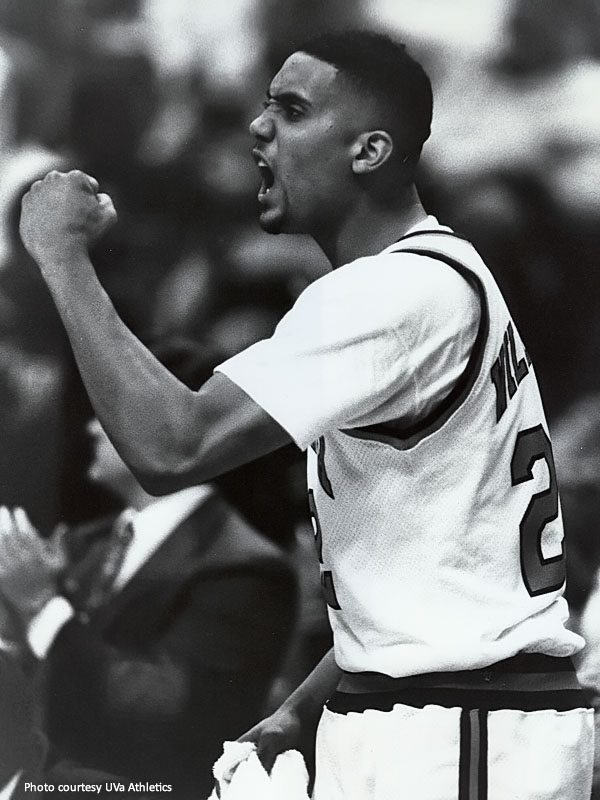 |
|
Jason Williford helped lead Virginia to an Elite 8 NCAA Tournament run in 1995. |
Coach Williford: Not one thing, there are several things. First, the 94-95 run to the Elite 8. Awesome, awesome experience. And then, just the camaraderie of those teams – not just the one team. Even the NIT Championship team with [Bryant] Stith and [Anthony] Oliver, Ted Jeffries. All of those teams over that span, my four years. It was a tight-knit group. In fact, I still keep in touch with almost all of those guys on all of those teams over those years. Just that brotherhood and camaraderie – and obviously, that Elite 8 run – was special.
 Mike: Now that you’ve had many years to reflect on your time here, what do you think makes Virginia a special school to attend? Aside from what you might harp to recruits, what made it special for you personally?
Mike: Now that you’ve had many years to reflect on your time here, what do you think makes Virginia a special school to attend? Aside from what you might harp to recruits, what made it special for you personally?
Coach Williford: Well, it’s different for me. I’m a Virginia kid, born and raised in Richmond. Being able to stay in state and come to the state school, the education, and meeting a diverse group of people and making connections – memorable lifelong connections of people who are successful in all areas of life from the business world to athletics to entertainment. Just having the opportunity to meet folks at a school like this, and staying in-state – being able to stay home and go to the state school was really neat.
 Mike: Besides players you’ve kept up with, did you build a relationship with others from the regular student body who you still keep up with?
Mike: Besides players you’ve kept up with, did you build a relationship with others from the regular student body who you still keep up with?
Coach Williford: Absolutely. I lived in D.C. having worked at American University, and there’s a huge alumni group in the D.C. area. My wife’s a Virginia alum, finished in ’97. That was probably my best recruiting to this day – being able to ‘recruit’ her and convince her I was the right guy. Yeah, there are tons of folks I keep in touch with.
 Mike: What do you think it will take to get Virginia back to competitive play, reaching to the level of an Elite 8 Tournament team and maybe beyond?
Mike: What do you think it will take to get Virginia back to competitive play, reaching to the level of an Elite 8 Tournament team and maybe beyond?
Coach Williford: I’ll go back a little further than my time. I think it takes consistent winning. I’ll give Terry Holland and Jeff Jones tons of credit. They were able to win and be consistent over a long period of time. I think that’s what we have to do. Pete Gillen recruited talent. Dave Leitao recruited talent, and we’re reaping the benefits of the talent he recruited. However, we just haven’t won consistently. And kids we’re recruiting today don’t remember the ’95 Elite 8 run, much less remember Bryant Stith, John Crotty, Drew and Mel Kennedy, Kenny Turner, Richard Morgan … I’m just giving you all the names …
 Mike: Ralph Sampson …
Mike: Ralph Sampson …
Coach Williford: Oh, Ralph Sampson. Ralph is a dinosaur. He’s ancient to these kids we’re recruiting today. And so they have not seen consistent winning. I think the difference, when we were in school, we just continued the tradition that Ralph, Richard, Crotty and Stith left. Those guys laid the foundation. We have to lay a winning foundation. And once we do that, I think this thing will take off. I’m excited about helping make that turnaround.
 |
|
Williford during his years at UVa. |
 Mike: Where did you play professionally?
Mike: Where did you play professionally?
Coach Williford: I played in Iceland for a year, right out of school. I had no idea there was basketball in Iceland. I was all set to go to Portugal and my agent said, “That deal fell through. I’ve got another deal. Let’s go to Iceland.” So, I’m thinking beach, Portugal, nice, Europe. Now I’ve got to pack winter clothes and go to Iceland. That was a shock. But after Iceland I played three years in Korea, so four years professionally.
 Mike: Can you let us know how some of those experiences went for you and what it was like to play overseas? It’s obviously far different from playing in the U.S., for a number of reasons.
Mike: Can you let us know how some of those experiences went for you and what it was like to play overseas? It’s obviously far different from playing in the U.S., for a number of reasons.
Coach Williford: Some of it is not as physical, it’s a little more finesse in certain countries. Some countries are more physical. Iceland was different in that there was one American. The thing that was crazy to me was the team I played on. I’m thinking I’m going to play professionally and that’s all we’re doing – practicing all the time and playing games. But the team I played on in Iceland, some of those guys went to school, and some of those guys were working 9-5 jobs. We practiced after their work or school day, and we played games. They had lives outside of basketball, which was totally unexpected for me. And also, I had no idea that part of my contract was to coach the 20-and-under club team. So, I became a player on the main team and the head coach for the 20-and-under team, which is crazy.
But the biggest thing for me was just the treat of seeing different cultures, meeting different people and living in different parts of the world. It was an experience I will never forget. To be exposed to that because of basketball was an awesome treat. Basketball gave me a chance to travel and see some things I never would have.
 Mike: What country did you enjoy the most, either by playing for them or by visiting?
Mike: What country did you enjoy the most, either by playing for them or by visiting?
Coach Williford: The teams I played on were pretty good. But I’ll toot my own horn – I helped turn those programs around … just kidding. That would be a Cory Alexander-ism right there [smiling].
The countries were great. The treat about going to Korea was we went to Australia for training camp for a month every season. So Australia was nice. I visited places while in school [at UVa]. Yuri Barnes and I were on an all-star team that went to the Canary Islands, and also went to Barcelona, Spain. That was a treat. I’ve gone to Chili on an all-star team. I’ve been to numerous places and like them all.
 Mike: Who helped you the most with regard to your early coaching career? Who had the biggest impact or made you realize this is what you wanted as a career?
Mike: Who helped you the most with regard to your early coaching career? Who had the biggest impact or made you realize this is what you wanted as a career?
Coach Williford: I think I realized I wanted to get into coaching my junior year in school – my third year, sorry. I knew I wanted to play as long as I could, but at some point I would want to get into coaching. I think that was a product of my Dad, having been a player and coaching me in high school.
 Mike: Your father was your high school coach?
Mike: Your father was your high school coach?
Coach Williford: He was an assistant coach on my high school team. So, just seeing what his life was like – he was always in the gym, always at practice or playing. I think part of that rubbed off. I thank my Dad. I’d like to give Dennis Wolfe a ton of credit for allowing me the opportunity to get into college coaching. He saw something in me, and I’ve been able to do it for the last 11 years.
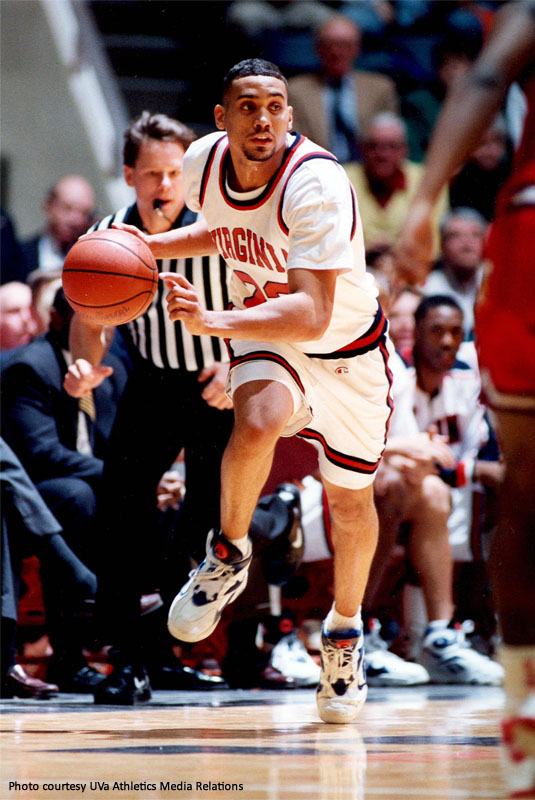 |
 Mike: You were with Jeff Jones at American as one of his assistants. What was it like working with him as a coach, as opposed to playing for him?
Mike: You were with Jeff Jones at American as one of his assistants. What was it like working with him as a coach, as opposed to playing for him?
Coach Williford: Jeff’s an awesome dude. I think, if you look at what he was able to do here at Virginia, his run was an incredible run. And if he would have had the run today that he had back then, he’d have a contract for life.
He is an excellent X and O teacher of the game – knows it inside and out. It was different seeing it and working with him day to day [as a coach]. As a player, you’re on the court. You come down for two hours of practice, they’re screaming and yelling at you, and you gotta do what they’re telling you to do. Then you go play the game. But you don’t see the preparation, the work he’s putting in. His IQ for the game is incredible. Just being able to learn and watch him interact day to day was pretty special. He’s probably one of the best basketball minds I’ve been around. JJ’s pretty good.
 Mike: Were you a consideration for either Pete Gillen or Dave Leitao’s staffs? Did either you or those coaches reach out to one another?
Mike: Were you a consideration for either Pete Gillen or Dave Leitao’s staffs? Did either you or those coaches reach out to one another?
Coach Williford: I did not with Coach Gillen. With Coach Leitao, I tried. And, in fact was offered a job his first year as the Ops guy [Director of Basketball Operations]. I was flattered he offered me the position, but at that time I didn’t feel I wanted to come off the road and severe recruiting contacts.
 Mike: You were already an assistant coach at the time?
Mike: You were already an assistant coach at the time?
Coach Williford: Correct. I wanted to be on the floor, recruit, continue to make contacts and grow my network. I’m not in this for money or for being at the highest level, I love the game. And so it was never an issue of getting to the ACC. I played in the ACC, I know what the ACC is about. It was more or less, I wanted to get back to Virginia but I wanted to do it by being on the floor and giving something back to those guys.
 Mike: The fact that you choose to hold off ended up being the best decision with regards to coming back to the team and sticking around, as Coach Leitao was fired and now you’re on Coach Bennett’s staff instead – which could be a longer tenure.
Mike: The fact that you choose to hold off ended up being the best decision with regards to coming back to the team and sticking around, as Coach Leitao was fired and now you’re on Coach Bennett’s staff instead – which could be a longer tenure.
Coach Williford: We hope so. It was definitely a hard decision for me and my family [to turn down Coach Leitao]. I have a wife and two kids and had to take all of that into consideration. But it was very tough to say no to Virginia when Dave offered that to me his first year.
The very next year I had an opportunity to come back and interview again. I think he hired Bill Courtney at the time. I couldn’t argue with that hire after Courtney helped build that George Mason Final Four run. Dave would have been foolish to hire me over Bill. But, it all worked out and I was able to come back home.
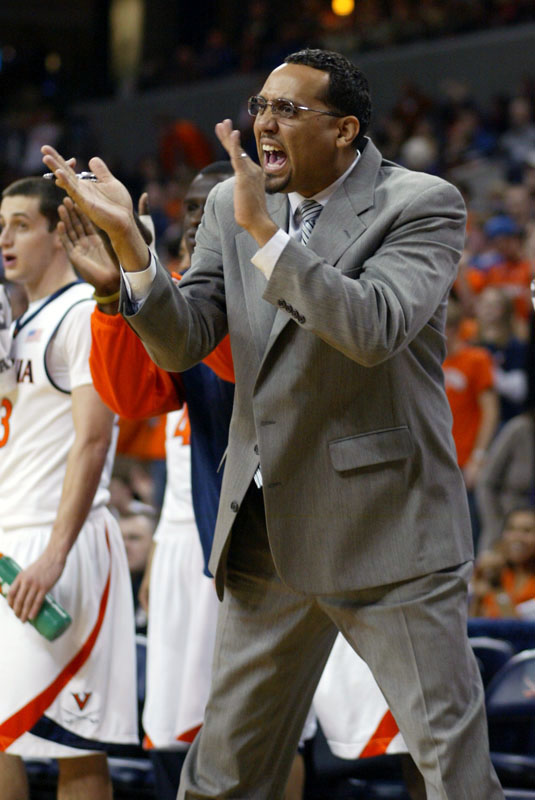 |
 Mike: How were you approached to coach at UVa? Did Bennett contact you or did you contact him first? Were Jon Oliver or Craig Littlepage involved at all?
Mike: How were you approached to coach at UVa? Did Bennett contact you or did you contact him first? Were Jon Oliver or Craig Littlepage involved at all?
Coach Williford: It’s a funny story. I never reached out to Tony. I never reached out to Oliver or ‘Page. I called Ron Sanchez. Ron and I had known each other from my years on the road at Boston University and American. Just having seen him out – we would sit in gyms and talk. I had never met Tony or Coach McKay and only knew Ron. I said, ‘Ron, I’m hearing that Tony Bennett’s the guy …’ I knew there was talk of Tubby [Smith] and all of these guys. And I said, ‘Ron, I’m hearing that Tony’s going to get the job. If he gets the job, I would love to come back. Virginia’s my alma mater and I would love to come back and work for him.’ Well Ron had no idea that I played at Virginia. I would have assumed that we talked about that over the years, and I guess we didn’t. He was like, ‘Tony, I’ve got a guy and you should take a hard look.’ So I said to Ron, ‘I’m coming down. It’s his press conference and I’m in D.C. I’m going to make the 2-hour drive and be there. Can I meet with him?’ He says, ‘Don’t come during the press conference. It’s a whirlwind, and that’s the last thing he’s going to want. Just don’t do it.’ Any other time, I would not have listened. I did not come. I think by not coming and showing patience, and trusting in Ron and Tony … I think that’s what actually got me the interview.
 Mike: Did you have a good feeling when you walked away from the interview?
Mike: Did you have a good feeling when you walked away from the interview?
Coach Williford: I thought I had a good shot. I knew there were some other candidates. But, walking away I think [Coach Bennett] was impressed. I actually wore khakis, a blazer and a Virginia tie for the interview. I think he understood what I stood for and what I bled. I think that helped.
 Mike: Was it safe to assume Tony was looking for an assistant with Virginia roots and someone with ties to high school recruiting and the AAU system?
Mike: Was it safe to assume Tony was looking for an assistant with Virginia roots and someone with ties to high school recruiting and the AAU system?
Coach Williford: Absolutely. And coming from Boston University to American, making contacts and getting to know guys in that DMV [D.C., Maryland and Virginia] area was a plus.
 Mike: How does it feel coming back to coach at your alma mater? What does it mean to you?
Mike: How does it feel coming back to coach at your alma mater? What does it mean to you?
Coach Williford: It’s a dream job. Obviously there have been a few opportunities to look at potential head coaching jobs. I want to get this program back to where it should be. It means the world to me to be back here. I bleed orange and blue. I also bleed back and gold for my Pittsburgh Steelers [points to Steelers memorabilia in his office]. There’s a love for this University – there’s a passion. You can see it when I’m on the practice court. You can see it in games. We’ll get this turned around. But being back here is awesome. This has always been where I wanted to coach and where I wanted to be. Hopefully I can do this for a long time.
 Mike: A number of people have suggested that Coach Bennett is the right fit for Virginia. Talk about what you think he brings to the table.
Mike: A number of people have suggested that Coach Bennett is the right fit for Virginia. Talk about what you think he brings to the table.
Coach Williford: I think he brings a humility and integrity to the job. What you see is what you get. The University of Virginia is about integrity, is about excellence, and he’s going to do it the right way. We’re not going to cut corners. We’re going to recruit character. We’re going to recruit students. And we’re going to recruit good basketball players. He’s going to build it that way, and that’s what the University is about. He’s one of the most likable people you’ll ever meet.
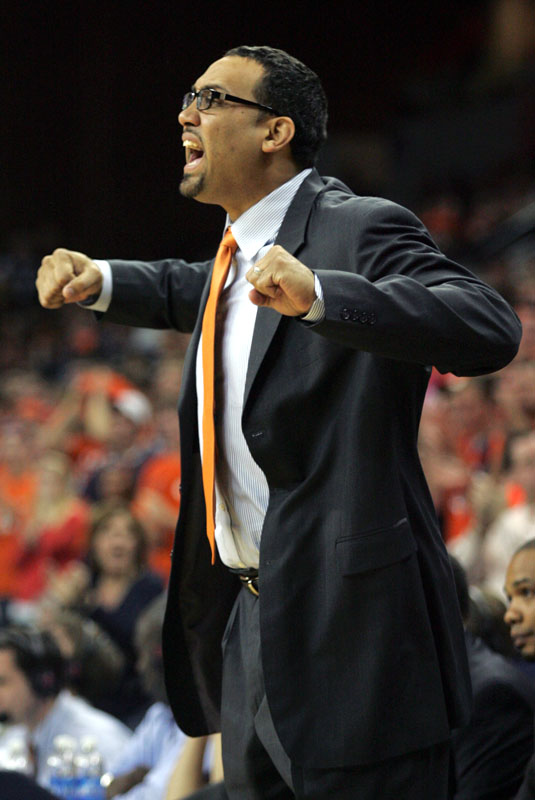 |
 Mike: Coaches divide things up and help all around obviously, but what’s your primary area of responsibility for on-floor coaching and which players do you work with?
Mike: Coaches divide things up and help all around obviously, but what’s your primary area of responsibility for on-floor coaching and which players do you work with?
Coach Williford: I primarily work with the ‘bigs’ [post players], Coach Sanchez and I. I do a lot of recruiting. And then I help with the day-to-day operations of the basketball office. I assist Tony on the floor with scouting, and game planning. More recently I’ve been a huge part of the scout team. I keep telling Tony, ‘I’m 38 now. I’m 30 pounds overweight and I’m not sure I can do this much longer.’ [On the scout team] I’m Tyler Zeller or the big boy [Reggie] Johnson at Miami. I’m those guys on scout teams. So a huge portion of the basketball season, the practices, I’m running scout team plays.
 Mike: [Jokingly] So those extra 30 pounds helps make you the equivalent of a seven footer in Tony’s eyes?
Mike: [Jokingly] So those extra 30 pounds helps make you the equivalent of a seven footer in Tony’s eyes?
Coach Williford: I hope he’s doing this to help me lose the weight. But after the season it takes me about four months to recover. [Laughing] I’m going to have to get in much better shape.
 Mike: What things do you like to emphasize with the ‘bigs’?
Mike: What things do you like to emphasize with the ‘bigs’?
Coach Williford: Physicality. Being tough. Being a presence on both the offensive and defensive boards. And then being strong and playing through contact. Catching. Finishing. And having patience when you catch it – not to rush. Make a move, but make it from a position of strength – strong base. And all the fundamentals of basketball. But, just being physical. I think the game is won or lost on the boards. If we can be physical and control the boards, that helps us.
 Mike: Assane Sene made great strides from his sophomore to junior years. Can you talk about that sort of development in players and how important it is to have kids for four years?
Mike: Assane Sene made great strides from his sophomore to junior years. Can you talk about that sort of development in players and how important it is to have kids for four years?
Coach Williford: I say this all the time, and I think our fans will see this. If you play as a freshman, you’re just happy to be on the floor. Once you play that year, there’s a huge jump to your second year. But the jump that most guys make, if they stay in school long enough, is from their second year to their third year. It’s a huge jump. I think Assane [Sene] made that last year. It just took him longer because he didn’t play much.
 Mike: But isn’t much of it just mental and physical maturity?
Mike: But isn’t much of it just mental and physical maturity?
Coach Williford: Absolutely. You see it in the pros. I’ll use my own experience. I didn’t play much as a first year. In fact, I played very little and probably should have red-shirted. My second year, I was just happy to be on the floor and didn’t want to make mistakes. By my third year, now I know I’m going to be on the floor. Now I can go from not worrying about making mistakes to ‘What can I actually do that helps this team?’ and ‘Where can I score?’ I know I’m going to be on the floor, this is what I can do.
And that’s why we have to grow this program with kids that are four-year [players], stay in the program, and continue to get better each year.
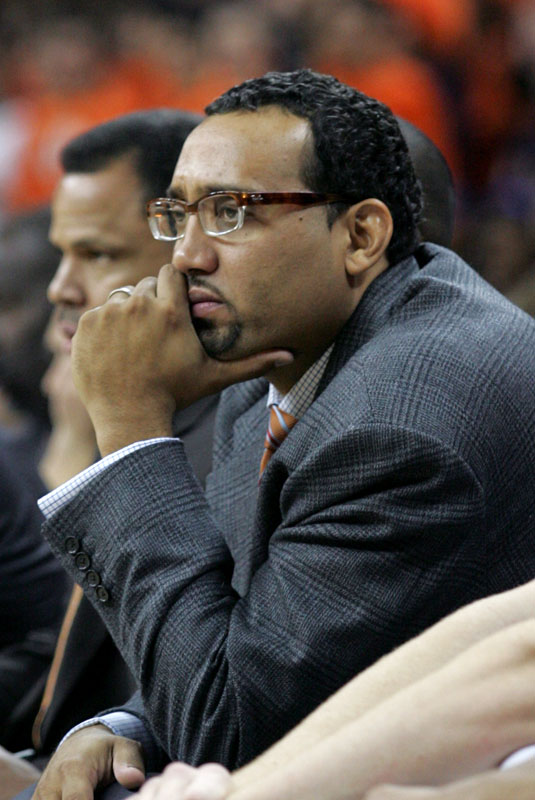 |
 Mike: Both Coach Bennett and Coach McKay have been head coaches. What’s it like to work with those two in terms of your development as a coach? What one or two important things have you picked up on from those two?
Mike: Both Coach Bennett and Coach McKay have been head coaches. What’s it like to work with those two in terms of your development as a coach? What one or two important things have you picked up on from those two?
Coach Williford: [Pauses]
 Mike: You’ve learned nothing from them?
Mike: You’ve learned nothing from them?
Coach Williford: [Laughs] No, I’ve learned a ton. I think with Tony, it is patience. He gets his point across without being the screamer, the yeller, the curser. And that’s probably more of my make-up. I’ve probably got more of the screaming and yelling style coaching. So, I’ve learned patience and how to deal with people without having to get on them or chew them out.
I think Coach McKay’s got a ton [that he brings to coaching] – I mean, he’s done it at every level. He’s been all over the place. I think he’s a great offensive mind. Just learning some of his offensive strategies [has helped].
And obviously with Tony, I think we’re the same make-up defensively. We’re very competitive. We want to beat everybody every time we step on the floor. So, that competitive drive – watching him day to day. I’ve learned a ton from both of them. I’ve also learned what not to do [laughing]. I’ve taken a great deal from both of them.
 Mike: Do you see similarities with Tony with the roots of Virginia basketball – the Terry Holland and Jeff Jones years – with regard to tough defense and moving without the ball on offense?
Mike: Do you see similarities with Tony with the roots of Virginia basketball – the Terry Holland and Jeff Jones years – with regard to tough defense and moving without the ball on offense?
Coach Williford: Funny you say that. I tell them that all the time. I didn’t play for Holland, but J.J. was a disciple of Holland. For me, having worked for Dennis Wolff who worked under Jeff – having worked for Jeff, all I’ve known are defensive principles. You’re going to play strong defense, man to man. Offensively, we’ll score – but we’re going to stop guys. Yes, it’s very similar. I said that to Tony when I first got here. We didn’t call it ‘Pack’ defense. That’s obviously what his dad put in. But it was a lot of the same principles – a lot of the same philosophies defensively.
I think Tony wants to score more, and I think we will. But I think you have to find a way to beat teams. And if that means not running up and down with Carolina and getting in a track meet, you don’t get in the track meet. You do what you have to do to win the game. I think we’ve gotten a bad knock for our style of play. Unfortunately, schools use that to recruit against us. But you when you look at the last few Final Fours – look at the championship game from two years ago. I think the game was in the 50’s [referring to 2010, Duke 61, Butler 59]. So, when you get to the highest level, you’d better be able to play half court basketball. When you can score, you take advantage of those opportunities. But the games – when they mean something at the end of the year in postseason play – those games are played in the half court. And that’s what we’re trying to get these guys to understand, because that’s what we want to be.
We go into each game and we give ourselves a chance to win. And our scouting report is ‘what’s going to give us the best opportunity to win?’ And that’s how we’re going to play this particular game. So if we go in and we can score 80 points and win, so be it. But if we got to score 60 to win the game, we’ll do that, too.
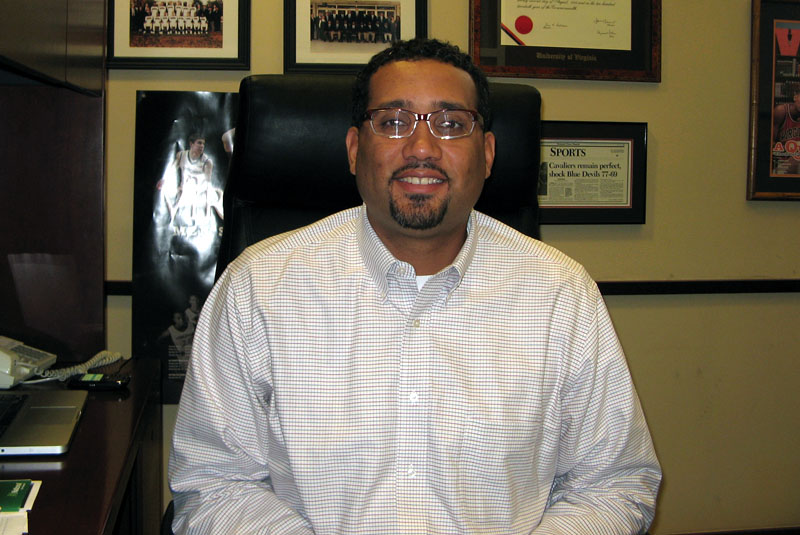 |
|
Coach Williford in his office during the interview. |
 Mike: Your staff has made incredible strides on the recruiting trail. Talk about the recruiting approach and the possibilities for Virginia to be a contender once all of these kids get some experience.
Mike: Your staff has made incredible strides on the recruiting trail. Talk about the recruiting approach and the possibilities for Virginia to be a contender once all of these kids get some experience.
Coach Williford: I think we’ve just gotten in early with kids. I think Virginia is an easy sell. It’s got the best facilities in the country. It competes in the best basketball league in the country. The thing is, getting involved and getting the kids here to see it. And we’ve been fortunate to do that. Now, we don’t get seduced by rankings and our ‘classes’ because at the end of the day you’ve got to go play the game. Now, we won’t know until these guys are in their second and third years how good these classes really are. But on paper, we’ve got some pretty good talent and we’re excited about it.
Our approach has been to get involved early. Get guys that are about what we’re about as a program, and who can cut it academically. Obviously we would love to recruit the state and just lock the state up. But there has to be a need and a specific year for kids within the state. Unfortunately there’s just not a lot of size in the state of Virginia. Trying to go find size, we’re going to have to go outside the area.
It’s simple: character, student, basketball player. If they come from Virginia, great. But we don’t care if they’re [from outside the state], we just want the best players for how we’re going to play.
 Mike: With Sammy Zeglinski graduating, the only true point guard to back up Jontel Evans is a freshman Teven Jones . You obviously like more experience at point guard. We’ve seen Malcolm Brogdon help at point this year. Can he be an effective relief point guard?
Mike: With Sammy Zeglinski graduating, the only true point guard to back up Jontel Evans is a freshman Teven Jones . You obviously like more experience at point guard. We’ve seen Malcolm Brogdon help at point this year. Can he be an effective relief point guard?
Coach Williford: I think Malcolm will do it very similar to the way Harold Deane played. If fans can remember, Harold was a bull dog. He got in the lane. He got to the free throw line. Malcolm’s bigger, taller. Harold was probably a better shooter at the same stage. But I think Malcolm will be able to do it that way. I think he’s got an unbelievable feel. He can pass. And within our system, once we’ve entered the ball, they are all playing off motion and using screens – offensively the adjustment is much easier for him. From an offensive standpoint, he’s really good. I think he’s probably one of our better ‘feel’ guys – using ball screens, passing, and seeing the floor – we’ve had in a long time.
Mike Ingalls founded TheSabre.com as a hobby in 1996 under the name VirginiaFootball.com. The site changed its name, became a business, and earned fully credentialed media status in 1998. “The Sabre Interview” appears periodically on the TheSabre.com as Mike sits down for in-depth interviews with your favorite Hoos.

